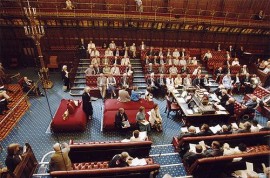
Jack Straw has published at last his proposals on reform of the House of Lords. (You can read about them here). The reform debate has been going on a long time: who knows if it will come to an end this time.
Labour came to power in 1997 pledging to reform the House of Lords and removed most of the hereditary peers as a result. 92 of them remained in place, along with the Anglican bishops and all kinds of people nominated by the party political leaders for one reason or another (this is where the loans scandal comes from).
Since then, Labour has won two more general elections on a pledge of completing the process of reform, and might just be about to do it.
The immediate problem may be summarised as an attempt to create a democratic second chamber which does not challenge the primacy of the lower house. An elected second chamber might be a rival: an appointed second chamber would not be legitimate. The various attempts to square this circle – a mix of appointed and elected members in varying proportions – merely create an ellipse.
Federal Union would solve the problem by establishing an indirectly elected second chamber, for which the electorate would be elected members of local councils and devolved legislatures. The twin problems of democracy and rivalry are solved both at once. And a brake is introduced to the Westminster system against centralisation: lower levels of government will have a direct voice in the legislative process which they lack at present. (Read more about the Federal Union proposal here.)
First, members of the European Commission do not pass legislation. They merely propose it in draft form to the Council of Ministers and the European Parliament, both democratically elected, which are the bodies that have the right to approve or reject the proposals.
Secondly, members of the European Commission are themselves confirmed in office by the democratically-elected European Parliament. No such confirmation process applies to members of the House of Lords.
